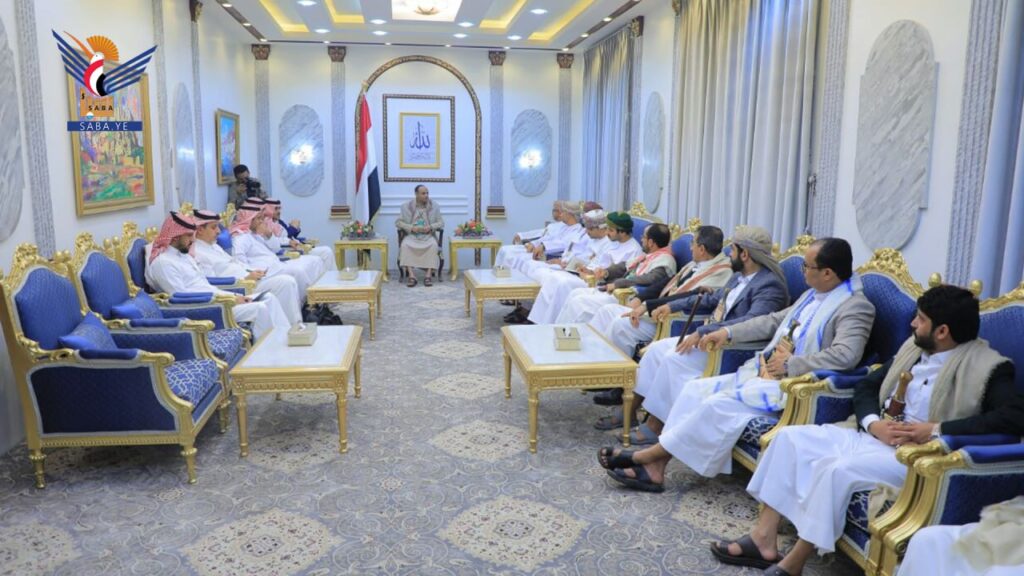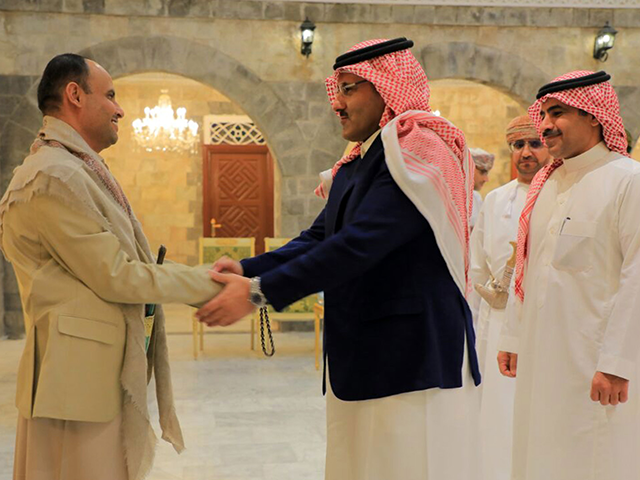The Houthi-run Saba Yemen News Agency revealed on Sunday that a delegation from Saudi Arabia, accompanied by diplomats from Oman, met senior Houthi leaders in the occupied capital, Sana’a, for peace talks.
The public negotiations between the Saudis and Ansar Allah, or the Shiite Houthi terrorist organization, represent a major breakthrough for the Yemen civil war, which began in 2014 with the Houthi movement taking over Sana’a and forcing the Sunni-led legitimate government of Yemen to flee to the southern port city of Aden. The war has led to one of the world’s most harrowing humanitarian disasters, fueled by the uncontrolled spread of disease and famine.

President Al-Mashat receives Omani & Saudi delegations at Republican Palace in Sana’a on April 9, 2023. (Yemen News Agency (SABA))
Saba, the Houthi-run Yemeni newsgroup, published photos on Sunday of Saudi and Omani government officials in Yemen’s capital meeting with the head of the Houthi “Supreme Political Council,” Field Marshal Mahdi Muhammad Al-Mashat.
“President Al-Mashat affirmed the firm stance towards a just and honorable peace that the Yemenis aspire to and achieve their aspirations for freedom and independence,” Saba reported. “For his part, the head of the Saudi delegation thanked the brothers in Sultanate of Oman for their important role and great efforts in the framework of bringing peace to Yemen and their keenness to support peace and stability in Yemen.”
Other than listing the individual officials present at the meeting, Saba offered few details on the negotiations. Reuters reported that the goal of the talks was to “negotiate a permanent ceasefire deal.”
“Sources have told Reuters that the Saudi-Houthi talks are focused on a full reopening of Houthi-controlled ports and Sanaa airport, payment of wages for public servants, rebuilding efforts and a timeline for foreign forces to exit the country,” the news agency added.
The Agence France-Presse (AFP) reported separately, citing an anonymous source in the government of Yemeni, that the Saudi government had come to an agreement with the Houthi terrorists “in principle to declare a six-month truce, which would pave the way for three months of negotiations and a two-year ‘transition’ towards peace.”
At least one official in the legitimate government of Yemen, Information Minister Moammar Eryani, appeared to confirm the talks on Monday and implied that the Yemeni government was involved in the mediation in some way.
“Progress for achieving political peace in Yemen is a win for constitutional legitimacy and the coalition led by our brothers in the Kingdom of Saudi Arabia … especially in light of the positive developments in the region of which the Saudi-Iranian agreement is the most important,” Eryani wrote in a post published to Twitter.
The Saudi government has not confirmed those reports, however, or even confirmed that its delegation visited Sana’a this weekend. The last such encounter the Saudi government confirmed, through the state-run Saudi Press Agency (SPA), occurred on April 6 between the country’s defense minister, Prince Khalid bin Salman, and the legitimate government of Yemen. The defense minister reportedly met with the head of the Presidential Leadership Council that replaced Hadi, Rashad al-Alimi, and issued a joint call to “reach a comprehensive political solution to the crisis in Yemen” as soon as possible.
“During the meeting, we reviewed our strong and brotherly relations and reaffirmed the kingdom’s continued support for Yemen and the PLC in a way that meets the aspirations of the Yemeni people and help bring an end to the crisis and achieve a comprehensive political solution,” Prince Khalid said at the time.
The United Nations envoy to Yemen, Hans Grundberg, called the talks the “closest Yemen has been to real progress towards lasting peace.”
Saudi Arabia has vocally supported the Yemeni government against the Houthis, granting refuge to former President Abdrabbuh Mansour Hadi, who stepped down a year ago, and offering military aid to the Yemeni army. Saudi Arabia’s top geopolitical rival, Iran, has supplied weapons to the Houthi rebels and enthusiastically opposed Saudi efforts, such as blockades intended to keep weapons out of Houthi hands, on the international stage.
The escalation in diplomatic efforts this week between Riyadh and Sana’a follows the shock announcement in March by the governments of both Iran and Saudi Arabia, in coordination with the Chinese Communist Party, that the two nations had restored diplomatic ties. Following a collapse in the relationship between Saudi Arabia and the United States under leftist President Joe Biden, in part fueled by the Biden administration’s bizarre decision to remove the Houthi insurgents from the official U.S. government list of foreign terrorist organizations, the Saudi royal family revealed that it had engaged in China-mediated talks with Iran intended to normalize the bilateral relationship.
Since the State Department announced the delisting of Ansar Allah from the foreign terrorist organization list in February 2021 – one of the Biden administration’s first acts in power – the Houthis have increased their attacks and threats on Saudi oil tankers and other oil industry infrastructure, leading the Saudi government to warn that it could not guarantee the world that Saudi oil supplies would remain on the market so long as the Houthis were threatening refining facilities and other sites.
“Saudis consider the relationship as being strategic, but (feel) as being let down at a time when we thought that America and Saudi Arabia should be together in facing what we would consider to be a joint, not just irritant, but danger to the stability and security of the area,” senior royal family member Saudi Prince Turki al-Faisal said in May 2022 in response to the Houthi delisting.
Last week, the foreign ministers of Iran and Saudi Arabia met in Beijing to discuss reopening embassies and consulates, scheduling commercial flights between the two countries, and building economic ties.
The talks focused on “boosting cooperation, including resuming flights, carrying out reciprocal visits of official delegations and the private sector, and facilitating the issuance of visas for nationals of the two countries, including for performing Umrah [pilgrimage to Mecca],” according to the Saudi Foreign Ministry.

COMMENTS
Please let us know if you're having issues with commenting.